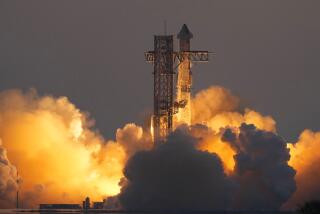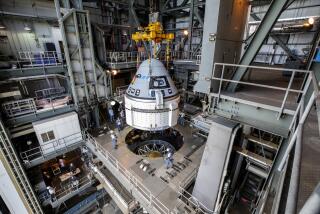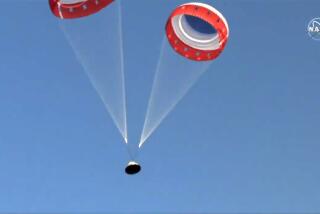Discovery Landing Delayed; NASA Probes Atlantis’ Booster
- Share via
KENNEDY SPACE CENTER, Fla. — Thick fog and clouds shrouded the space shuttle landing strip Friday and forced NASA to keep Discovery and its five astronauts in orbit an extra day.
Mission Control promised commander Terence T. Henricks that he and his crew would be back on Earth early today, nine days after taking off. Although forecasters expected another foggy morning at Kennedy Space Center, the weather at Edwards Air Force Base in California was declared “pristine” for a landing.
Engineers on the ground, meanwhile, were focusing on a booster problem experienced by Atlantis last month that could delay NASA’s next shuttle flight.
Hot gas from burning rocket fuel penetrated up to a primary O-ring, or seal, in a nozzle joint of Atlantis’ left solid-fuel rocket booster during liftoff on June 27. The rubber seal--one of two--was singed slightly, said Keith Henson, manager of NASA’s solid-rocket motor program.
Neither the shuttle nor its seven astronauts and cosmonauts were in danger, NASA officials said.
A leak in a different booster joint caused the shuttle Challenger to explode shortly after liftoff in 1986, killing all seven crew members aboard.
The last time a similar gas penetration occurred in a booster nozzle joint was last fall, but in that case the seal wasn’t damaged, Henson said.
Failure of a booster nozzle could cause a shuttle to veer dangerously off course during the initial phase of flight.
Henson defended NASA’s decision to launch Discovery six days after Atlantis returned from a docking mission with the Russian space station Mir. That’s the shortest gap ever between shuttle flights.
There was no indication that the Atlantis boosters should have been checked more thoroughly before launching Discovery on July 13 on its satellite-delivery and science mission, Henson said.
Discovery’s two solid-rocket boosters, meanwhile, were sent by rail to a Thiokol Corp. plant in Clearfield, Utah, for analysis. That’s where the problem with Atlantis’ booster was discovered early this week.
The inspections will determine whether NASA will try to launch Endeavour on Aug. 5 as planned.
More to Read
Sign up for Essential California
The most important California stories and recommendations in your inbox every morning.
You may occasionally receive promotional content from the Los Angeles Times.













